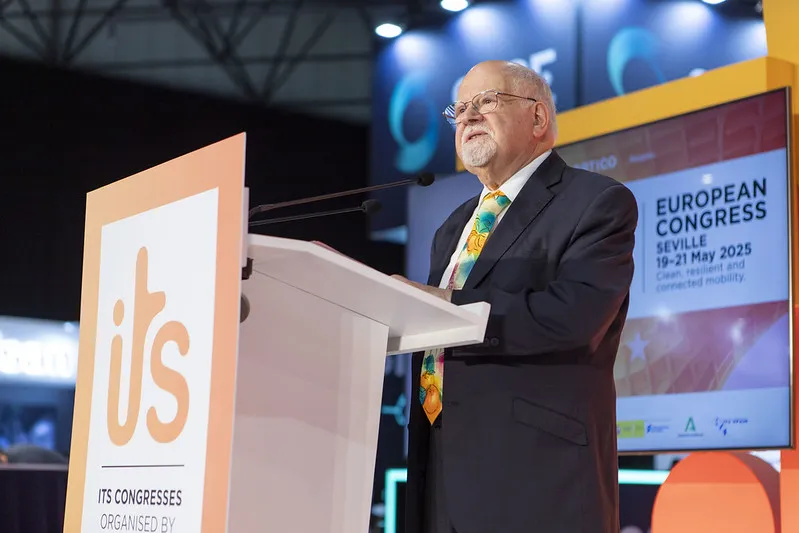“Policymakers are facing greater levels of uncertainty in decision making, with the speed, nature, intensity and timing of change”
Ministers of Transport from around the world have called for more international co-operation to create transport systems for the needs of a changing world.
“Global transformational change is a characteristic of our age”, ministers from the 54 member countries of the International Transport Forum (ITF) state in a declaration agreed today at their Annual Summit in Leipzig,
May 23, 2014
Read time: 3 mins
“Policymakers are facing greater levels of uncertainty in decision making, with the speed, nature, intensity and timing of change”
Ministers of Transport from around the world have called for more international co-operation to create transport systems for the needs of a changing world.
“Global transformational change is a characteristic of our age”, ministers from the 54 member countries of the998 International Transport Forum (ITF) state in a declaration agreed today at their Annual Summit in Leipzig, Germany.
Noting the impact of megatrends like demographic change, digitalisation, shifting trade flows and climate change, the ministerial declaration states:
“In this environment of transformation, policymakers are facing greater levels of uncertainty in decision making, with the speed, nature, intensity and timing of change in recent years occurring beyond what has been expected.”
“The reality of governing in this interconnected world requires greater emphasis on international and regional co-operation as well as information sharing, and suggests that policymakers should work together more effectively to adopt common policy responses.”
“While adapting to these global economic and societal phenomena, transport itself is also a driver of change, as innovation in the sector opens new frontiers. In this way, transport is itself defining new landscapes of opportunity for a greener and more inclusive economy and society.”
Ministers in their declaration also issued a “call for development as appropriate of international standards for implementing new technologies alongside agreed safety and privacy protocols.”
Ministers also adopted a renewed mandate for the International Transport Forum, which underlines the role of the ITF as a global organisation covering all transport modes. It sets as objectives for the ITF “to serve as a global platform for discussion and pre-negotiation of transport policy issues across all modes”, to “foster a deeper understanding of the role of transport in economic growth, environmental sustainability and social inclusion” and to “raise the public profile of transport policy.” It also spells out the instruments through which ITF will work towards these objectives.
The renewed mandate builds upon the Ministers’ Declaration adopted in Dublin in 2006 which established the International Transport Forum. Ministers meeting in Leipzig recalled the “significant progress made over the ITF’s initial period of development towards meeting the objectives set out in the Dublin Declaration.”
In adopting the renewed mandate, Ministers also highlighted that in view of the positive development of the organisation over the past eight years, “the ITF is well-positioned to carry out its renewed mandate, pursuing its vital role in serving the transport sector and its stakeholders across the world.”
Ministers of Transport from around the world have called for more international co-operation to create transport systems for the needs of a changing world.
“Global transformational change is a characteristic of our age”, ministers from the 54 member countries of the
Noting the impact of megatrends like demographic change, digitalisation, shifting trade flows and climate change, the ministerial declaration states:
“In this environment of transformation, policymakers are facing greater levels of uncertainty in decision making, with the speed, nature, intensity and timing of change in recent years occurring beyond what has been expected.”
“The reality of governing in this interconnected world requires greater emphasis on international and regional co-operation as well as information sharing, and suggests that policymakers should work together more effectively to adopt common policy responses.”
“While adapting to these global economic and societal phenomena, transport itself is also a driver of change, as innovation in the sector opens new frontiers. In this way, transport is itself defining new landscapes of opportunity for a greener and more inclusive economy and society.”
Ministers in their declaration also issued a “call for development as appropriate of international standards for implementing new technologies alongside agreed safety and privacy protocols.”
Ministers also adopted a renewed mandate for the International Transport Forum, which underlines the role of the ITF as a global organisation covering all transport modes. It sets as objectives for the ITF “to serve as a global platform for discussion and pre-negotiation of transport policy issues across all modes”, to “foster a deeper understanding of the role of transport in economic growth, environmental sustainability and social inclusion” and to “raise the public profile of transport policy.” It also spells out the instruments through which ITF will work towards these objectives.
The renewed mandate builds upon the Ministers’ Declaration adopted in Dublin in 2006 which established the International Transport Forum. Ministers meeting in Leipzig recalled the “significant progress made over the ITF’s initial period of development towards meeting the objectives set out in the Dublin Declaration.”
In adopting the renewed mandate, Ministers also highlighted that in view of the positive development of the organisation over the past eight years, “the ITF is well-positioned to carry out its renewed mandate, pursuing its vital role in serving the transport sector and its stakeholders across the world.”










